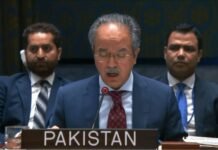Vienna, 2 August 2022 (TDI): The Organization of Petroleum Exporting Countries (OPEC) appointed Haitham Al Ghais as its new Secretary General.
Al Ghais took the post of Secretary General at the Organization’s Secretariat in Vienna, Austria. Therefore, he was appointed as Secretary General for three years at the special meeting of the OPEC Conference held on 3 January 2022.
OPEC today welcomed its new Secretary General, HE Haitham Al Ghais of Kuwait. HE Al Ghais was appointed by acclamation for the post for a three-year term at the Special Meeting of the OPEC Conference held on 3 January 2022. pic.twitter.com/5s92R3BUOE
— OPEC (@OPECSecretariat) August 1, 2022
Moreover, he replaced the late Secretary General of OPEC, Mohammad Sanusi Barkindo who passed away.
“It is a great honour for me to be at the helm of an Organization that has been instrumental in supporting a stable and sustainable supply of oil to the world for more than 61 years,” Al Ghais said.
He further added that throughout its history, OPEC has been at the forefront of promoting dialogue. Together with cooperation and partnerships to achieve its mission.
Haitham Al Ghais
Haitham Al Ghais is a well-known Kuwaiti oil executive and a respected oil technocrat. He has great experience in the oil sector.
The Secretary-General has about thirty years of experience in the Global oil industry. Furthermore, he has advised six Kuwaiti oil Ministers.
Coupled with these experiences, he also served as Kuwait’s Governor for OPEC from 2017 to 2021. He was a Member of the Organization’s Internal Audit Committee, which he chaired later.
In addition to this, he also played an important role in developing the Charter of Cooperation of OPEC.
OPEC
The Organization of Petroleum Exporting Countries was founded in Iraq, with the signing of an agreement in September 1960. That is, by five countries namely Iran, Iraq, Saudi Arabia, Kuwait, and Venezuela.
Therefore, the mentioned countries were joined later by Qatar (1961), Indonesia (1962), Libya (1962), the United Arab Emirates (1967), Algeria (1969), Nigeria (1971), Ecuador (1973), Gabon (1975), Angola (2007), Equatorial Guinea (2017) and Congo (2018).
OPEC coordinates as well as unifies the petroleum policies of its Member Countries. As well as ensures the stabilization of oil markets in order to secure an efficient, economic, and regular supply of petroleum to consumers.
Along with a steady income to producers, and a fair return on capital for those investing in the petroleum industry.








